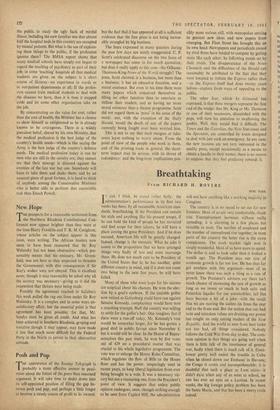Posh and Pop
TILE appearance of the Sunday Telegraph is probably a more effective answer to pessi- mism about the future of the press than reasoned argument. It will take time to shake down into its self-appointed position of filling the gap be- tween posh and pop, and perhaps a little longer to become a steady source of profit to its owners; but the fact that ii has appeared at all is sufficient evidence that the free press is not being inexor- ably strangled by big business.
The fears expressed in many quarters during the past few days are surely exaggerated. C. P. Scott's celebrated discourse on the two faces of a newspaper has come in for much quotation; but does it really apply to this case--the Odhams- Thomson-King-News of the World struggle? The press, Scott claimed, is a business, but more than a business; it has an educative function, and a moral existence. But even in his time there were many papers which conceived themselves as filling no other function than to entertain or titillate their readers, and as having no more moral existence than a theatre programme. Scott did not regard them as 'press' in his sense of the word: nor, with the exception of the Daily Herald, would the death of any of the papers currently being fought over have worried him.
This is not to say that such mergers or take- overs leave nothing to worry about. From the point of view of the people who work in them, and of the printing trade in general, the short- term impact may be serious, with its threat of redundancy; and the long-term implications pos- sibly more serious still, with monopolies striving to prevent new ideas and new papers from emerging. But Fleet Street has brought this on its own head. Newspapers and periodicals owned by rival firms have tended to compete by getting more like each other; by following trends set by their rivals. The disappearance of the News Chronicle and the difficulties of the Herald can reasonably he attributed to the fact that they were tempted to imitate the Express rather than —as the Express itself had done twenty years before—explore fresh ways of appealing to the public.
The other fear, which Jo Grimond has expressed, is that these mergers represent the thin end of the wedge; that Mr. King or Mr. Thomson or one of their successors, dissatisfied with the pops, will turn his attention to swallowing the coshes. Well, they would find it difficult. The Times and the Guardian, the New Statesman and the Spectator, are controlled by trusts designed to deal with just such an emergency. In any case, the new tycoons are not very interested in the quality press, except occasionally as a means to obtain a handle to their names; there is no reason to suppose that they feel predatory towards R.










































 Previous page
Previous page